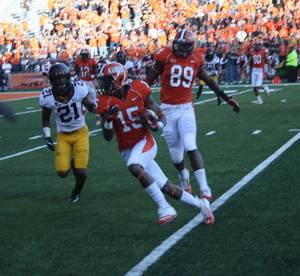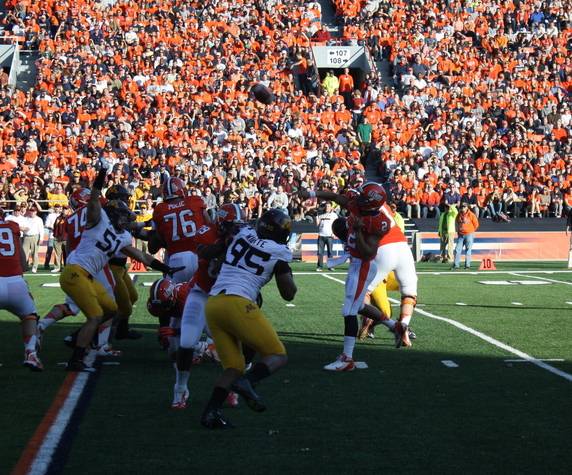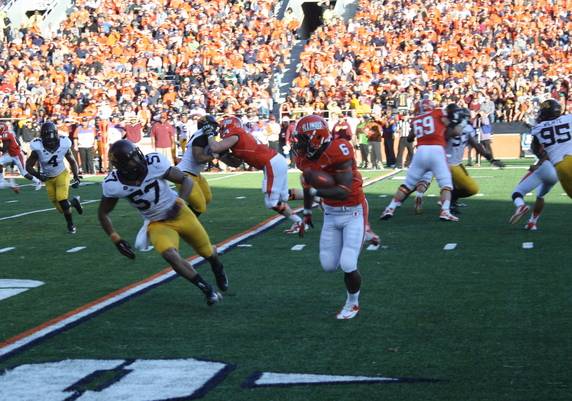 Saturday was Dad’s Day for the football team, and the images of the smiling fathers of the players put me in a reflective mood. Given the state of this season, and knowing that many of those fathers’ pride must be mixed with the disappointment felt by their sons and daughters, it seems fair to ask the questions: What are we doing? What is the point of all of this? The fans, and the offense, are asking: where’s the goal line?
Saturday was Dad’s Day for the football team, and the images of the smiling fathers of the players put me in a reflective mood. Given the state of this season, and knowing that many of those fathers’ pride must be mixed with the disappointment felt by their sons and daughters, it seems fair to ask the questions: What are we doing? What is the point of all of this? The fans, and the offense, are asking: where’s the goal line?
By now you know the result. Illinois lost on Saturday to Minnesota in the penultimate home game for the Illini this season. Illinois kept it close throughout the first half and the defense looked to be making improvements in certain areas. But it wasn’t enough, as the Illinois offense never got into the end zone: a lone field goal being the only scoring the Illini did all day. Illinois’ inability to get to the end zone has been dogging this team since last year. A late turnover allowed the Gophers to tack on an extra seven, making the final tally 17–3 as Illinois lost its seventh consecutive game, and its 12th conference game in a row. That last one is a brutal number considering there’s only eight conference games in an entire season.
The bright spots, few and far between as they were, came mostly in the “good news for down the road” category. Mason Monheim, a true freshman linebacker, was named Big Ten Freshman of the Week for the second time. One can never have enough competent linebackers on a team, and if he continues to improve the way he has over the course of the season, fans can expect several years of meaningful contribution from Mr. Monheim.

What else was good? The weather, windy but unseasonably warm. That’s about it.
Fans will be forgiven for being apathetic, or even apoplectic, about the remainder of the season. Two games remain — the last home game, Senior Day, against Purdue, followed by the season-ender at Northwestern the Saturday following Thanksgiving. Even if Illinois wins both games, no one could fairly describe the season as a whole as anything other than a terrific disappointment.
Seeing those fathers watch their sons struggle mightily and fall to the Gophers got to me, in particular. I’ve been absent from this space since sometime last month, having not weighed in on an Illinois opponent since prior to Homecoming. My wife, Clare, and I had a homecoming of our own, welcoming our first child, John Dean, into the world. College football took a back seat for a bit, but I’m back now. And with a whole lot more perspective.
My wife and I met as undergraduates at the University of Illinois, and continue to have a lot of close friends from college, so it was no surprise when the baby shower brought lots of Illini-themed merch. Given the football team’s struggles, it was hard not to see those tiny adorable socks with the big block I as the world’s smallest millstones, a burden of fandom and frustration not to be put on my firstborn lightly.

Joking aside: what if John wanted to play football? With what is currently known about traumatic brain injury, would I let him? What if he wanted to devote his life to big money college football, either as a player or beyond, as a coach? Would I feel a pang of disappointment, borne of a deeply suppressed fear that, deep down, it’s all so much triviality and pageantry?
I think I would let John play football, albeit after a long speech about the risks of life and educating oneself about them, and then living with your decisions and without fear. And I wouldn’t categorically say that I wouldn’t be proud if John devoted his life to athletics, though the opportunities to go astray are manifold.
Two recent articles that I came across in The New York Times provide nice bookends for my feelings on this, even though only one is about college football. Liberty University, the mostly-online school started by Jerry Falwell, is making no secret of its desire to enter the upper echelons of college football, and its willingness to spend enormous amounts of money in pursuit of that goal.
The pervading belief behind the school’s goal could be callously summed up as “Jesus Loves Winners,” and it’s hard not to see something depraved being revealed in our culture when an Evangelical Christian school believes, likely correctly, that if they want to get their message in front of more people they need to do it through America’s (or at least the Southeastern United States’) true religion: college football.
The other article, the one that kept me from abandoning all hope for finding redemptive qualities in competitive athletics, was this one.
Yes, college football (and college basketball, and the pros too) are not without fault, and fixing those faults must always remain a topic of conversation. But to abandon the cause entirely is to deny who we are and who we want to be. There’s something inherent in the human condition that drives us not just to eat and sleep, but also to play. The fact that we have developed sports equipment durable enough to be used at a camp for former child soldiers in Rwanda is less informative on the present state of mankind than the fact that there’s a demand for such a thing.
That demand makes it hard to believe that there isn’t a proper place in University life, in any community, for competitive athletics. We, as a University, and as a community, and as individuals, are born to play. We’re equally born to strive for a collective identity, and sport provides, or can provide, a healthy outlet for that collectivism in a way that organized religion, driven by sectarianism, no longer does. As sure as we are born to play, we are innately driven to contest abilities with one another, and to band together and send forth the best of “us” to compete against the best of “them.” These two drives, to play and to compete, can be harnessed to balance each other to positive harmlessness, even joy. Even the child solider, having seen the worst side of one drive, innately finds refuge in the best side of the other.
Illinois football is hurting, and it is certainly worthwhile to ask whether we as a University, and as a community have invested in competitive athletics in ways that are unhealthy and counterproductive. I won’t claim to know the full contours of what purpose sport should play in the life of a community. I have serious personal doubt that pursuing Bowl wins is the best way to spread an Evangelical Christian belief system, but as I ask others to refrain from telling me how to practice my faith, I must do the same.

But though doubt of its utility may always creep into my mind, when I feel that sports may be useless, I need only imagine a pile of discarded soccer balls, used to uselessness by people struggling with the most dire of basic needs, and know that as all humans need goals, so too do they need goal lines, elusive to define and find though they may be.
Welcome to the world, John Dean. See you all Saturday. There are still lots of games left to play.
All photos courtesy of T. McDade








